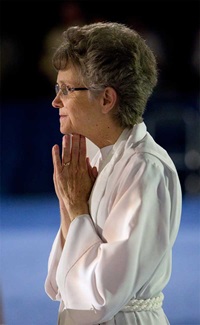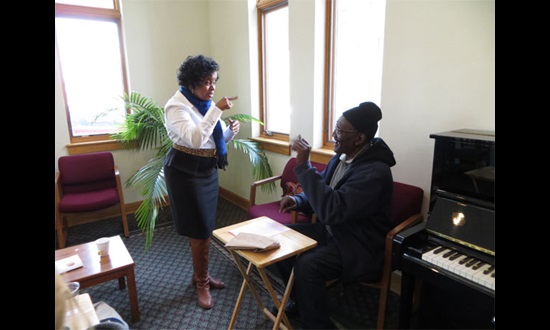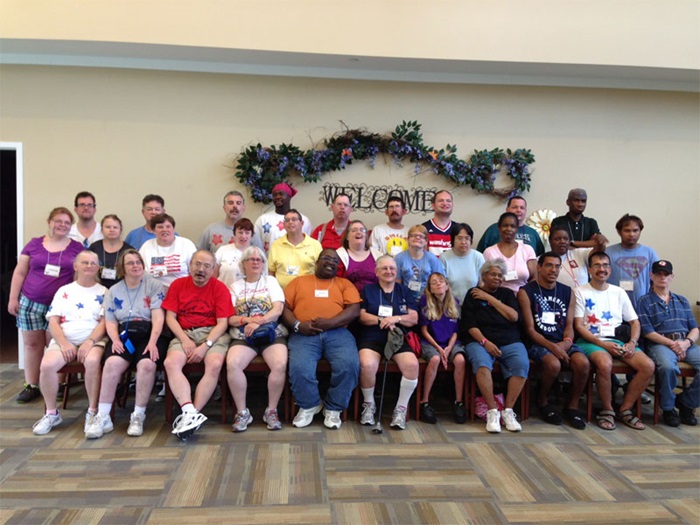 On Palm Sunday morning in April 2009, I was guest preacher at Epworth United Methodist Church in Rehoboth Beach, Delaware—a congregation led at that time by the Revs. Pat Loughlin and Jonathan Baker. Rev. Loughlin had asked this question: “Are there Deaf and hard of hearing people in our community who have no church home?” In response, I had brought an American Sign Language (ASL) interpreter, Carol Stevens, with me. Having been informed in advance, a number of local Deaf people attended the service. There had never been Deaf people at Epworth before.
On Palm Sunday morning in April 2009, I was guest preacher at Epworth United Methodist Church in Rehoboth Beach, Delaware—a congregation led at that time by the Revs. Pat Loughlin and Jonathan Baker. Rev. Loughlin had asked this question: “Are there Deaf and hard of hearing people in our community who have no church home?” In response, I had brought an American Sign Language (ASL) interpreter, Carol Stevens, with me. Having been informed in advance, a number of local Deaf people attended the service. There had never been Deaf people at Epworth before.
Since I used to be pastor of an all-Deaf congregation in Baltimore, Maryland, I preached in ASL and Carol turned my signs into spoken words for the hearing. It was a unique experience for hearing people to see a sermon in sign and be dependent on reverse interpreting to understand it. Rev. Loughlin was happy that the Deaf visitors had come to her church to see the sermon but was shocked to learn that none of them had a regular church home. “I was surprised,” she said, “when Carol told me that 98 percent of people who are Deaf do not attend church. The simple reason is that we, the church, offer nothing for them and don’t even recognize them as a community. That was eye-opening,” she admitted, “and mind-blowing at the same time.”
Opening Doors by Signing
A short time after that experience, Epworth UMC hired a professional sign language interpreter every Sunday. As a result, a number of Deaf people began regularly attending the worship service. One of them was David Bendekovits, from Lewes, Delaware. David was fond of signing music, and it wasn’t long before he became a member of the praise band. With the assistance of an interpreter, he made wonderful signs, enhancing the beauty of the joyous music. Then a church member built a wooden platform for him, so that as he stood near the band, he could feel the vibrations of the music in his feet. David liked the platform so much that an additional vibration platform was built under the sanctuary’s front-row seats. That allowed the music to be felt by all the Deaf congregants who sat there.
Soon, interpreting the weekly worship service led to interpretation for other church activities as well, including Lenten services, small group meetings, concerts, classes for new members, and pastoral care. Now, at Epworth UMC, Deaf members are integrated into the life of the church as much as the hearing members are. Deaf members can read Scripture, teach Bible studies in American Sign Language, and be involved in many of the church’s outreach programs—such as the church garden (which provides fresh vegetables for the soup kitchen) and Volunteer-in-Mission trips, along with the hearing members.
Pastor Pat went on to Wesley Theological Seminary to pursue a Doctor of Ministry degree. For her thesis project, she designed a website, “DeafOpenDoors,” to serve as an information-gathering site for the Deaf community. Since communication between Deaf and hearing members is important for meaningful human interactions, the church also offers American Sign Language classes for both adults and children. As a result, many hearing members have been signing along with the Deaf members during hymns and prayers. Both hearing and Deaf members of the church participate in the annual Deaf community’s Labor Day Picnic and the Free Deaf Tax Day (ASL interpretation provided for the Deaf to meet with tax preparers). Some of the hearing children in the church have been taught how to fish by a Deaf member who is expert in this skill. Epworth’s current senior pastor, the Rev. Vicky Stains, supports the church’s work in the Deaf community.
Hearing members have often commented that “being together in worship with the Deaf community is another way for us to experience the joys of being radically hospitable.”
Extending a Helping Hand
On the other side of the Peninsula-Delaware Conference, in the City of Wilmington, Delaware, another Deaf ministry sprang up at Grace United Methodist Church. Grace UMC’s pastor, the Rev. Anne Pruett-Barnett, has always had a “mission heart.” She leads her church members to be in ministry in the community as a witness to their faith in Christ.
As a city church, Grace UMC is committed to urban ministry. In 2010, the congregation hired a Deaf outreach worker, Karen Miller, to work with the many low-income Deaf people in the community. “I touch a lot of people who don’t know about God’s grace,” Karen observes, “many of them poor, inner-city Deaf people. I serve people who are in prison, addicted, deaf-blind, or struggling with mental health issues,” she continues. “I also help hearing people who are connected to the Deaf community. We try to make everyone feel welcomed.”
Some ways that welcome is extended include a ministry of advocacy for services, interpretation, establishment of new programs for Deaf group homes, and mental health services. Karen has mentored Deaf children who study at the Delaware School for the Deaf. She also works as a Deaf role model with hearing parents to inform them about the programs available for their Deaf children. She can often be found visiting private homes, nursing homes, and hospitals. In fact, she recruited me to visit a man who was in hospice and wished to speak to a signing pastor just before he died.
She also arranges sign language classes for hearing people, a movie night, the annual Deaf community picnic and Deaf Christmas party, a Free Deaf Tax Day, a Black Deaf Expo, and a wonderful, one-week residential camp for Deaf adults with special needs, held at Camp Pecometh in Centreville, Maryland.
Encouraging Leadership
 Karen also assisted Lonnie (not his real name), a Deaf man who would often come to Grace UMC to talk. After he and his wife lost their house, the wife moved temporarily out of state while the couple waited for their name to be called for Section 8 housing. Lonnie preferred to live in his car as a means of making sure that he would get the Section 8 housing when his turn came. Karen helped him budget his money and find local soup kitchens for his meals. Finally, the housing certificate came through. Now Lonnie and his wife are reunited and living in their new apartment. They attend the Deaf picnic and other events at Grace Church.
Karen also assisted Lonnie (not his real name), a Deaf man who would often come to Grace UMC to talk. After he and his wife lost their house, the wife moved temporarily out of state while the couple waited for their name to be called for Section 8 housing. Lonnie preferred to live in his car as a means of making sure that he would get the Section 8 housing when his turn came. Karen helped him budget his money and find local soup kitchens for his meals. Finally, the housing certificate came through. Now Lonnie and his wife are reunited and living in their new apartment. They attend the Deaf picnic and other events at Grace Church.
Another person whom Karen assisted was Margie (not her real name), a Deaf victim of domestic violence. She needed to be relocated 3,000 miles away to get help from a Deaf Domestic Violence program out West. Karen advocated for and got state funding for Margie’s travel expenses, then accompanied her on her flight to help her get settled into her new apartment.
Karen has also been on mission trips to a Deaf school in Jamaica. Last summer, she represented the Northeastern Jurisdictional United Methodist Congress of the Deaf at an international Methodist Deaf Conference in Nairobi, Kenya. She brings leadership to the annual conference and will be attending the United Methodist Women’s Assembly in Louisville with me in April.
The Rev. Pruett-Barnett describes Karen in this way: “The characteristics that enable Karen to give strong leadership to this ministry are her faith, resolve, persistence, directness, and vision. She continues to tap into these God-given gifts as she seeks to be true to her call to unify the Deaf community in our city and beyond.”
“The ministry of our church family has been enriched in many ways by the addition of this ministry,” Rev. Pruett-Barnett affirms. “On the third Sunday of every month, members of the Deaf community in our urban area come to worship, and an American Sign Language interpreter, Carol Stevens, signs. I was deeply touched—and later discovered that others in the church family were touched as well—when, during the signing of ‘Crown Him with Many Crowns,’ I looked at the Deaf persons signing in concert: ‘Crown him, crown him, crown him Lord of all.’ Tears came to my eyes as the hymn’s meaning became clearer than ever before! What a gift to be drawn deeper into Jesus this way!”
Bishop Peggy A. Johnson serves as episcopal leader for the Philadelphia Area of The United Methodist Church, Northeastern Jurisdiction, which includes the Eastern Pennsylvania and Peninsula-Delaware conferences. Before her appointment as bishop, she served as a pastor in the Baltimore-Washington Conference. This article was first published in New World Outlook magazine, May-June 2014 issue.
PHOTOS
Bishop Peggy Johnson prays during opening worship at the 2012 United Methodist General Conference in Tampa, Florida. Photo: Mike DuBose/UMNS
Camp Pecometh in Centreville, Maryland, a residential camp for Deaf adults with special needs. Photo: Peggy A. Johnson
Sarah Whittle (Sign Language interpreter) and Edward Wiggins (Deaf client) at Grace UMC’s Deaf Tax Day, Wilmington, Delaware. Photo: Jeff Blackwell

